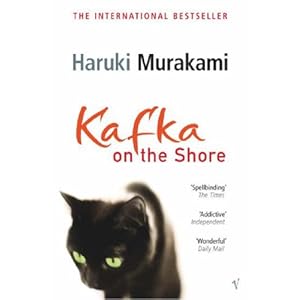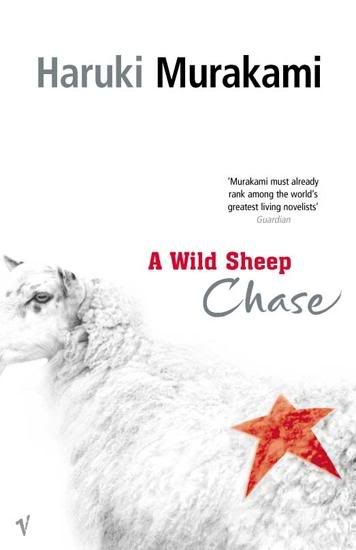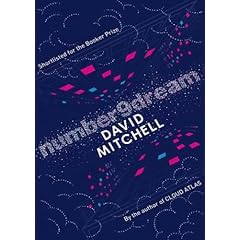I'm not quite sure where to begin, but after finishing a Murakami novel, that's not altogether too surprising. The Wind Up Bird Chronicle is oft' touted as Murakami's best and most notable work, and that's what I was hoping for - to be completely blown away. And yet, despite the book being bizarre and ambitious in equal measure, I was left disappointed. The book starts out with Toru, the protagonist, looking for a cat adopted by him and his wife, that's gone missing. Toru has quit his job, has no real ambition, and is just drifting through life, trying to figure out what is it he wants to do, while his wife brings home the money.
When the initial search for the cat is fruitless, he ventures further out to the "alley", and ends up meeting a high-school dropout, May Kasahara. His relationship with May evolves, and is almost bordering on pedophiliac. Still no luck finding the cat, so, he ropes in Malta and Creta Kano - the two psychic sisters, both of whom have interesting life stories, and end up visiting Toru in his dreams, as well as in reality.
And then, as things go, his wife leaves home for work one day, but never returns. In due course, our protagonist discovers that she's left him, without a word. As one does. And then, a sequence of extraordinary events, and interactions with fascinating characters sees his life spin (or should I say, tailspin?) out of control, where he's no longer the master of his own destiny; instead, he's struggling to figure out what on earth's going on.
There's the experiences as he sits in solitude at the bottom of the dry well, and then there's the mysterious phone calls; the dreams which aren't really dreams, and the reality that's a tad distorted. All of it is a bit confusing - I'm all for magical realism, but this is just a little too over the top; a little too cryptic.
The book does cover a lot - from World War II, and the story of the solider and the spy, which had me absolutely gripped, to World War II, and the story of the animals that were heartlessly massacred, which had me depressed and lamenting.
'The officer gave his order, and the bullets from the Model 38 rifles ripped through the smooth hide of a tiger, tearing at the animal's guts. The summer sky was blue, and from the surrounding trees the screams of cicadas rained down like a sudden shower.''
It has the obligatory contemporary political slant, which most books by Murakami (that I've read) touch upon, if not focus on. And, again, as expected, there's romance that fades away; and female characters all carrying way too much baggage. Add on strange names for some of the characters (Cinnamon and Nutmeg), and even stranger life stories, and it's all Murakami.
The thing is, I just really struggled to comprehend what was going on, and why. And then it all fizzled out, and became even more ambiguous and abstract - the second half of the book, that is. Normally, I love ambiguity and magical realism, but here, it just didn't "fit", I thought. Sometimes, it be that way. All the more disappointing, as I was glued to the first third/half of the book.
Have you read this much-acclaimed book? Were you as underwhelmed as I am, or is it just me?
 The vibrant cover of this book caught my attention while I was drifting through
The vibrant cover of this book caught my attention while I was drifting through  I read this as part of
I read this as part of  Ghostwritten is David Mitchell's first novel, and on finishing it, I've now read all his works, which pleases me greatly. Of course, the fact that this is a tremendous debut adds to the pleasure, albeit, I really do wish there was another Mitchell on my shelf, just waiting to be read.
The sub-title of the book reads, "a novel in nine parts," and so it is. It could easily a collection of nine short stories, each told in first person by a different narrator, who seemingly have nothing to do with the previous narrator(s). However, six degrees of separation (or fewer) bind the characters together, through time and different geographical locations. The link between the characters isn't blatantly evident though, as one might come to expect from Mitchell, and at times, it's confusing as to how the characters come together, and to figure out if there is any kind of causal sequence. That said, one can't help but anticipate the revelation of the link, and then deliberate over it for a bit, which in turn means that one can't help but read the book, scrutinising almost every word to see where the link lies.
Ghostwritten is David Mitchell's first novel, and on finishing it, I've now read all his works, which pleases me greatly. Of course, the fact that this is a tremendous debut adds to the pleasure, albeit, I really do wish there was another Mitchell on my shelf, just waiting to be read.
The sub-title of the book reads, "a novel in nine parts," and so it is. It could easily a collection of nine short stories, each told in first person by a different narrator, who seemingly have nothing to do with the previous narrator(s). However, six degrees of separation (or fewer) bind the characters together, through time and different geographical locations. The link between the characters isn't blatantly evident though, as one might come to expect from Mitchell, and at times, it's confusing as to how the characters come together, and to figure out if there is any kind of causal sequence. That said, one can't help but anticipate the revelation of the link, and then deliberate over it for a bit, which in turn means that one can't help but read the book, scrutinising almost every word to see where the link lies. This is the fifth book by
This is the fifth book by  Surrealism. I've reached the conclusion that it's the only word that can be used to describe Murakami's books. Kafka on the Shore is no exception. Leeches and fish rain down, there's a character called Johnnie Walker, and another called Colonel Saunders (of Kentucky Fried Chicken fame), a mysterious childhood "accident" results in one of the characters being able to speak to cats, and there's a portal to a parallel universe.
The book follows two characters in interleaving chapters: Fifteen year old runaway, Kafka Tamura and Nakata, an elderly man who is considered "dumb" by most as he is unable to read or write. While neither of them are aware of the other's existence, there's a greater (almost supernatural) force that connects them.
Surrealism. I've reached the conclusion that it's the only word that can be used to describe Murakami's books. Kafka on the Shore is no exception. Leeches and fish rain down, there's a character called Johnnie Walker, and another called Colonel Saunders (of Kentucky Fried Chicken fame), a mysterious childhood "accident" results in one of the characters being able to speak to cats, and there's a portal to a parallel universe.
The book follows two characters in interleaving chapters: Fifteen year old runaway, Kafka Tamura and Nakata, an elderly man who is considered "dumb" by most as he is unable to read or write. While neither of them are aware of the other's existence, there's a greater (almost supernatural) force that connects them. Note: Kafka on the Shore is the first Murakami I ever had on my shelf. It was given to me as a present sometime in 2008, and I kept "saving it" for the right occasion. I planned on reading it when I went on
Note: Kafka on the Shore is the first Murakami I ever had on my shelf. It was given to me as a present sometime in 2008, and I kept "saving it" for the right occasion. I planned on reading it when I went on  In terms of books being confusing and complex, this one ranks right up there. New characters being introduced every couple of pages, the story taking dramatic turns, changing from showing corruption while trading in the 18th-19th century to a surreal adventure story, and there's a love story thrown in, just for good measure as well.
But no - that's not all. In fact, that's simplifying it much.
In terms of books being confusing and complex, this one ranks right up there. New characters being introduced every couple of pages, the story taking dramatic turns, changing from showing corruption while trading in the 18th-19th century to a surreal adventure story, and there's a love story thrown in, just for good measure as well.
But no - that's not all. In fact, that's simplifying it much. The amazing thing about Murakami's books is, you never know what you're going to get - when that bridge between reality and surrealism will get crossed, and, what avenues the surrealism will take. Past experiences with Murakami have also taught me that the story is not going to be like anything I've read before. Experience is a great teacher.
A Wild Sheep Chase, originally published in the early 1980s, is literally the story about a young man (who is a partner at an ad agency and PR firm) and his girlfriend's (a girl with the most sensual ears) quest to find a sheep - not just any sheep, but a sheep with a star on its back; a sheep that, by all rights, shouldn't exist in Japan, where all sheep breeds have always been monitored and documented closely. You could say that their search is a metaphorical wild goose chase, but....
The amazing thing about Murakami's books is, you never know what you're going to get - when that bridge between reality and surrealism will get crossed, and, what avenues the surrealism will take. Past experiences with Murakami have also taught me that the story is not going to be like anything I've read before. Experience is a great teacher.
A Wild Sheep Chase, originally published in the early 1980s, is literally the story about a young man (who is a partner at an ad agency and PR firm) and his girlfriend's (a girl with the most sensual ears) quest to find a sheep - not just any sheep, but a sheep with a star on its back; a sheep that, by all rights, shouldn't exist in Japan, where all sheep breeds have always been monitored and documented closely. You could say that their search is a metaphorical wild goose chase, but.... Desperation leads one to do strange things; things one would not do under normal circumstances - things one would not even consider. This is the essence of one of the bleakest books I've read this year:
Desperation leads one to do strange things; things one would not do under normal circumstances - things one would not even consider. This is the essence of one of the bleakest books I've read this year:  After being absolutely delighted with
After being absolutely delighted with  So far, this year, I’ve read two books that can only be described as ‘coming of age’ books. This year, I’ve read two books based in Tokyo, where the protagonist comes from some small village in Japan, and have come to Tokyo with a purpose. This year, I’ve read two books that have the title of a Beatles song (well, one of them has a title from a Lennon song). And both books have been written by different authors! (The other book was David Mitchell’s Number9Dream. Mitchell’s oftened been likened to Murakami, so...)
So far, this year, I’ve read two books that can only be described as ‘coming of age’ books. This year, I’ve read two books based in Tokyo, where the protagonist comes from some small village in Japan, and have come to Tokyo with a purpose. This year, I’ve read two books that have the title of a Beatles song (well, one of them has a title from a Lennon song). And both books have been written by different authors! (The other book was David Mitchell’s Number9Dream. Mitchell’s oftened been likened to Murakami, so...) Although really difficult to read at times, as the book continuously drifts between fantasy and reality, this book was thoroughly enjoyable. While it’s the first book I’ve read by Mitchell, it definitely won’t be the last.
Although really difficult to read at times, as the book continuously drifts between fantasy and reality, this book was thoroughly enjoyable. While it’s the first book I’ve read by Mitchell, it definitely won’t be the last.